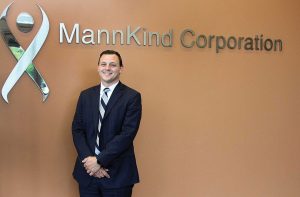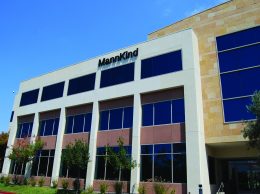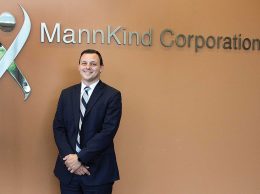
Michael Castagna, CEO of MannKind
Mannkind reported $2.16 million in revenues Aug. 7, for a net loss of around $35.3 million for its second quarter, and announced the launch of a clinical trial for its inhalable insulin product Afrezza in partnership with One Drop.
Revenues came primarily from the Westlake Village biotech company’s product sales, with $615,000 from collaborations and other intellectual properties. Revenues for the first half of the year came to $5.17 million, but costs also increased 51.6 percent to $56.3 million compared to the same period last year.
The CEO’s plan to increase revenue is paying off, albeit slowly. Afrezza net revenue grew 29 percent compared to the first quarter of 2017, and net losses stayed almost flat to the previous second quarter at 35 cents per share, including a write-down of expiring inventory that doesn’t affect the company’s cash on hand. But it is costing a lot to build out a sales force, with a 68 percent increase in selling, general and administrative expenses compared to the same period in 2016 drawing $7.5 million away from the bottom line.
Cash burn decreased during the quarter, CEO Michael Castagna said on the earnings call. Mannkind had $43.4 million in cash and cash equivalents as of the end of the quarter on June 30, with $85.9 million in current liabilities.
In addition to its partnership with One Drop, the company focused on working with payment plans to make the product available to patients, achieving a cost of $39 per month for users with a copay assistance program, and doubled down on its social media and TV marketing efforts, said Chief Financial Officer Patrick McCauley.
The trial will split participants with type 2 diabetes into two groups, one that tests just the One Drop Premium product, and one that combines it with the use of Afrezza, measuring changes in hemoglobin A1C and other factors like self-care, satisfaction with the products, and quality of life.
“Diabetes technology is evolving in a very exciting way,” One Drop CEO and founder Jeff Dachis said in a news release, including things like evidence-based interventions, coaching, wireless blood sugar tracking and data science. “But not surprisingly for the vast majority of people with diabetes worldwide, expensive sensors, automated insulin delivery solutions, or call center approaches to care can create barriers and challenges to effective disease management.”
The solution could also help lower costs for patients, he said.
“The combination of One Drop with inhaled insulin could offer consumers, health care providers, and payers a potentially powerful solution with unprecedented benefits,” said Chandra Osborn, vice president of health and behavioral informatics at One Drop.
Mannkind also said it would pursue an investigational new drug to treat pulmonary arterial hypertension, following a meeting with the U.S. Food and Drug Administration in June, and intends to file an application with the regulator by the end of the year.
Shares for the company ended Aug. 7 down 4.1 percent to $1.17.
• Contact Marissa Nall at mnall@pacbiztimes.com.






 Print
Print Email
Email

















